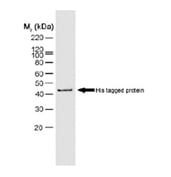-
US | en

Anti His tag Antibodies
Ideal tools for monitoring protein purification progress

Western blot of His tagged protein probed with Mouse anti Histidine tag antibody, clone AD1.1.10 (MCA1396) visualized with Rabbit anti Mouse IgG:HRP (STAR13B)
Our selection of conjugated anti-His tag antibodies saves you time by removing the need for a secondary antibody.
Like the MBP (maltose binding protein) and GST tag, the His tag is a small epitope tag consisting of between six to nine histidine residues, which is cloned into an expression vector upstream or downstream of a gene of interest. The vector is then introduced into an expression system such as bacteria, yeast or insect cells. The result is the expression of a recombinant protein carrying a polyhistidine tag at its N- or C-terminus.
In order to purify the recombinant protein immobilized metal affinity chromatography (IMAC) is performed. This technique is based on the fact that a cord of histidine residues binds to immobilized metals such as Nickel.
Anti-histidine antibodies can be used to monitor the progress of purification and the fraction containing the recombinant protein by western blotting, and to verify that no proteolytic degradation of the recombinant protein is taking place.
Did you know?
- Our anti-His tag antibody portfolio has been tested in ELISA, flow cytometry, immunofluorescence and immunoprecipitation
- Clone AD1.1.10 has been successfully used in 12 papers
- Anti-His tag antibodies are available directly conjugated to HRP and AP - making the use of secondary antibodies in Western blotting redundant
- For all your multicolor flow needs anti-His tag antibodies are available conjugated to a large selection of Alexa Fluor®, DyLight® and conventional dyes
- Clone ABD2.2.20 has been used extensively in ELISA for the data generated to characterise anti-idiotypic antibodies.
His tag antibodies
| Description | Specificity | Target | Format | Host | Isotype | Clone | Applications | Citations | Product Type | Code | Validation Types |
|---|
Related topics
- c-myc tag Antibodies
- DYKDDDDK tag Antibodies
- GST tag Antibodies
- HA tag Antibodies
- MBP tag Antibodies
- s-tag Antibodies
- Strep tag Antibodies
- VSV-G tag Antibodies
- V5 tag Antibodies
DyLight® is a trademark of Thermo Fisher Scientific Inc. and its subsidiaries.
Alexa Fluor® is a trademark of Molecular Probes Inc, OR, USA.


